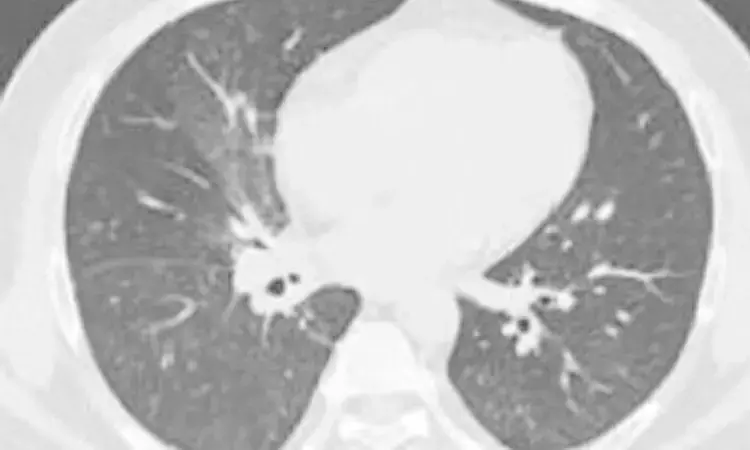- Home
- Medical news & Guidelines
- Anesthesiology
- Cardiology and CTVS
- Critical Care
- Dentistry
- Dermatology
- Diabetes and Endocrinology
- ENT
- Gastroenterology
- Medicine
- Nephrology
- Neurology
- Obstretics-Gynaecology
- Oncology
- Ophthalmology
- Orthopaedics
- Pediatrics-Neonatology
- Psychiatry
- Pulmonology
- Radiology
- Surgery
- Urology
- Laboratory Medicine
- Diet
- Nursing
- Paramedical
- Physiotherapy
- Health news
- Fact Check
- Bone Health Fact Check
- Brain Health Fact Check
- Cancer Related Fact Check
- Child Care Fact Check
- Dental and oral health fact check
- Diabetes and metabolic health fact check
- Diet and Nutrition Fact Check
- Eye and ENT Care Fact Check
- Fitness fact check
- Gut health fact check
- Heart health fact check
- Kidney health fact check
- Medical education fact check
- Men's health fact check
- Respiratory fact check
- Skin and hair care fact check
- Vaccine and Immunization fact check
- Women's health fact check
- AYUSH
- State News
- Andaman and Nicobar Islands
- Andhra Pradesh
- Arunachal Pradesh
- Assam
- Bihar
- Chandigarh
- Chattisgarh
- Dadra and Nagar Haveli
- Daman and Diu
- Delhi
- Goa
- Gujarat
- Haryana
- Himachal Pradesh
- Jammu & Kashmir
- Jharkhand
- Karnataka
- Kerala
- Ladakh
- Lakshadweep
- Madhya Pradesh
- Maharashtra
- Manipur
- Meghalaya
- Mizoram
- Nagaland
- Odisha
- Puducherry
- Punjab
- Rajasthan
- Sikkim
- Tamil Nadu
- Telangana
- Tripura
- Uttar Pradesh
- Uttrakhand
- West Bengal
- Medical Education
- Industry
Mycobacterium infection secondary to exogenous lipoid pneumonia caused by nasal drops

Exogenous lipoid pneumonia (ELP) is caused by aspiration of oily substances into the lungs, and results in symptoms, such as acute and chronic inflammation of the lungs, local pulmonary fibrosis, and granuloma, which can affect gas exchange and lead to respiratory failure, or even death in severe cases
Routine microbiological examination of samples for patients with diagnosed or suspected Exogenous lipoid pneumonia (ELP) is necessary.
Exogenous lipoid pneumonia (ELP) is a rare disease and its diagnosis is often mistaken or delayed. Secondary infection with rapidly growing non-tuberculous mycobacteria is a rare complication of lipoid pneumonia.
Researchers have reported a rare case of Mycobacterium infection secondary to exogenous lipoid pneumonia caused by nasal drops. The case has been published in BMC Pulmonary Medicine.
According to history a 38-year-old man presented with fever, cough, sputum, chest tightness, and shortness of breath. He had a 2-year history of allergic rhinitis and used liquid paraffin-containing menthol nasal drops daily. A chest CT scan showed multiple patchy ground glass opacities with blurred borders in both lungs, which were located in the inner pulmonary field and distributed along the bronchi. His ambient air PO2 was 63 mmHg. The patient was diagnosed with ELP by CT-guided lung biopsy. The nasal drops were discontinued, and systemic glucocorticoids were administered. During treatment, the pulmonary lesions deteriorated, and bronchoalveolar lavage was performed during bronchoscopy. Additionally, Mycobacterium abscessus was detected in the lavage fluid. Upon detection of a secondary M. abscessus infection, glucocorticoids were gradually discontinued, and anti-M. abscessus treatment was implemented. The patient’s symptoms rapidly ameliorated. After 11 months of anti-M. abscessus treatment, a repeat CT scan showed clear regression of the lung lesions.
Routine microbiological examination of samples, including sputum or alveolar lavage fluid, is necessary for patients with diagnosed or suspected ELP.
Reference:
Wang, H., Lu, S., Li, H. et al. Mycobacterium infection secondary to exogenous lipoid pneumonia caused by nasal drops: a case report and literature review. BMC Pulm Med 23, 47 (2023).https://doi.org/10.1186/s12890-022-02265-8
Dr. Shravani Dali has completed her BDS from Pravara institute of medical sciences, loni. Following which she extensively worked in the healthcare sector for 2+ years. She has been actively involved in writing blogs in field of health and wellness. Currently she is pursuing her Masters of public health-health administration from Tata institute of social sciences. She can be contacted at editorial@medicaldialogues.in.
Dr Kamal Kant Kohli-MBBS, DTCD- a chest specialist with more than 30 years of practice and a flair for writing clinical articles, Dr Kamal Kant Kohli joined Medical Dialogues as a Chief Editor of Medical News. Besides writing articles, as an editor, he proofreads and verifies all the medical content published on Medical Dialogues including those coming from journals, studies,medical conferences,guidelines etc. Email: drkohli@medicaldialogues.in. Contact no. 011-43720751


